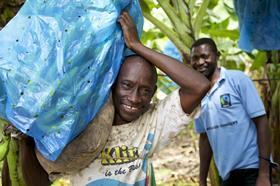
Fairtrade has announced that it is increasing its Minimum Price for bananas in response to rising export costs and falling import prices, which have taken a toll on producers’ livelihoods.
Due to come into effect on 1 January 2022, Fairtrade Minimum Prices for bananas are set to rise by an average of 8 per cent, with contracts for next year currently being negotiated between producers and buyers.
“The financial squeeze on banana producers has been devastating for their livelihoods and a real threat for their long-term gains,” said Nicolas Léger, Fairtrade’s global lead for bananas. “An uptick in the Fairtrade Minimum Price will provide vital support for banana producers, especially in these times of distress and global fluctuations in the market.”
The increase in banana export costs is reportedly being driven by a steep rise in the price of packaging materials, as well as a 60 per cent rise in freight costs, with costs expecting to continue growing in the months to come.
Production costs have equally been affected by the ongoing Covid-19 pandemic, as well as measures to protect against the fusarium TR4 fungus. Meanwhile, import prices have plummeted to a record 10-year low of less than €10 per box.
“It’s critical for the world to know, however, that Fairtrade’s efforts are only one part of the solution when it comes to banana farmers and workers earning a decent living,” Léger continued. “The banana industry as a whole needs to change to make banana farming sustainable in the long term.”
According to Fairtrade, producers will continue to receive the additional Fairtrade premium of US$1 per box of bananas sold, to be invested in projects of their choice. Over the past five years, banana farmers and workers have apparently received over €193m in Fairtrade premiums.
“Fairtrade is the only scheme with effective tools to respond to the social and environmental expectations of consumers and the banana industry,” said Marike de Peña, manager of a Fairtrade-certified banana cooperative and chair of the Dominican Republic’s National Fairtrade Network. “But the question remains as to how farmers at the bottom of the supply chain can respond to all these expectations without a firm industry commitment towards shared responsibility and sustainable prices.
“The race to the bottom in bananas will exclude more and more smallholders and medium-sized companies from farming. Fairtrade makes a strong call for change.”
The announcement to increase the Fairtrade Minimum Price for bananas follows the introduction of a Base Wage for plantations and a Living Wage Differential.
The Base Wage, introduced on 1 July, boosted wages by up to 15 per cent for banana workers, while the Living Wage Differential added a voluntary payment per box of bananas sold, as a contribution towards a full living wage.
“Producers are going above and beyond to meet the increasing sustainability demands from the market,' said Léger, 'working towards living wages and incomes, making their farms more environmentally friendly and meeting human rights due diligence requirements. Yet, the market prices do not match these costs, and are falling instead of increasing. This is not sustainable. Fair prices are needed now more than ever to meet these increasing demands. At Fairtrade, we are doing our best to ensure this happens.”



